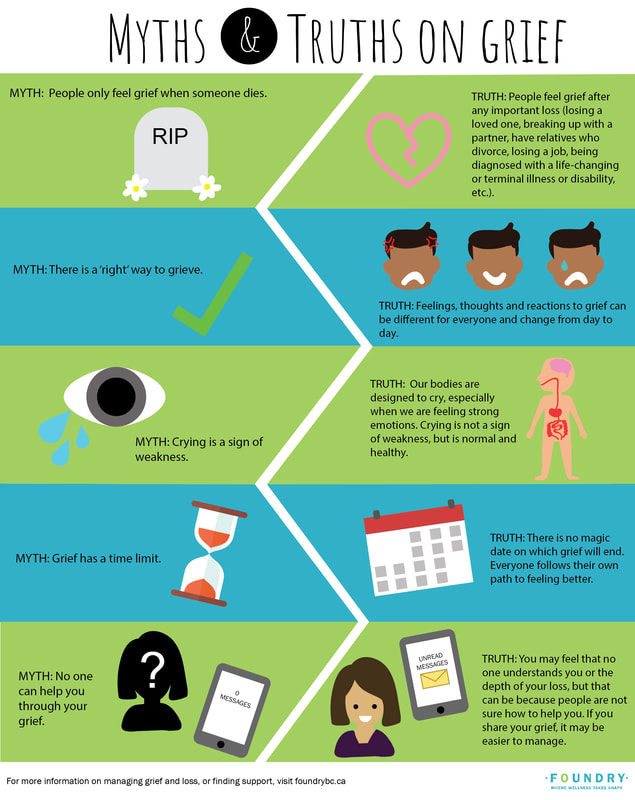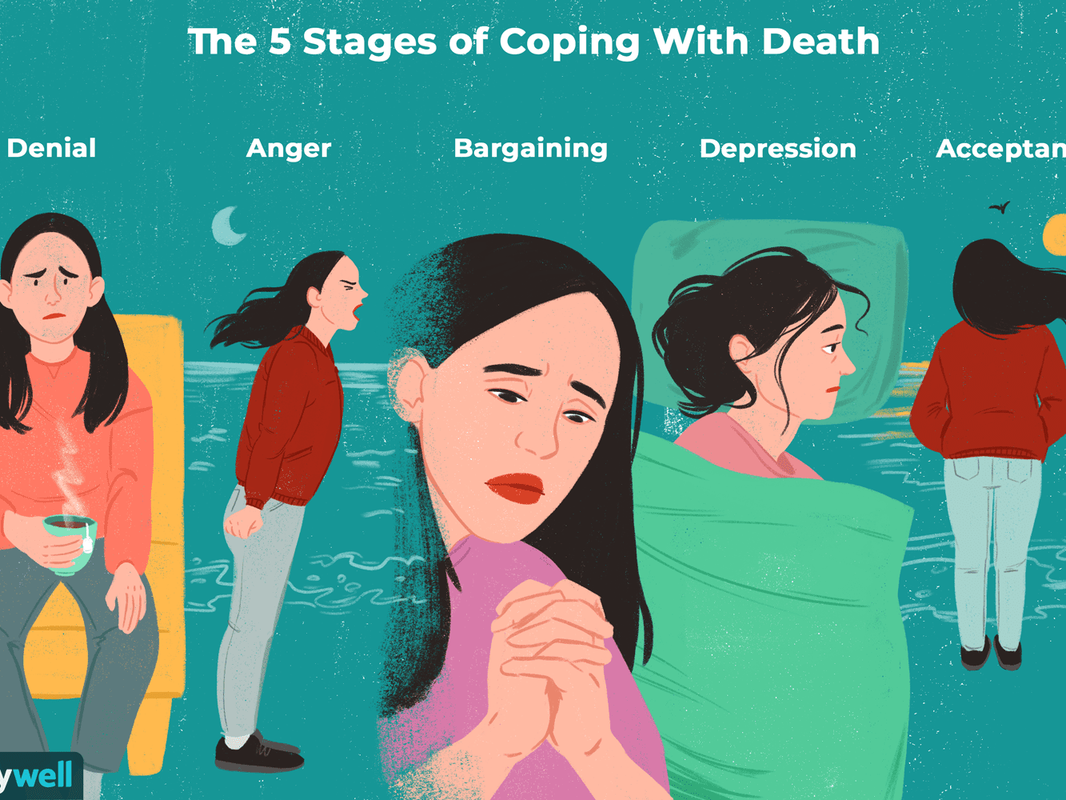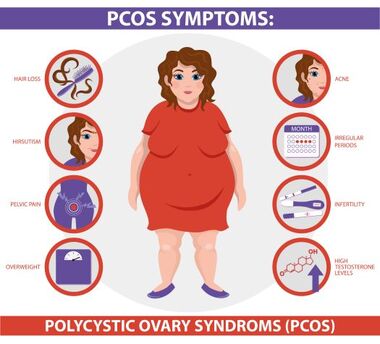|
Grief is a natural response to loss. It is the emotional suffering you feel when something or someone you love is taken away. The pain of the loss can sometimes be overwhelming. The more significant the loss the more severe the grief can be. Many people associate grief with the death of a loved one and this is often the most common cause of extreme grief, however any loss can cause grief. Below is a list of some other causes of grief.
1. Divorce or relationship breakups 2. Illness/ Sickness 3. Losing a job 4. Financial instability 5. A miscarriage 6. Retirement 7. Death of a pet 8. Loss of a dream 9. Loss of a friendship Whatever is the cause of your grief, it is important to know that there are healthy ways to cope with the pain, ease your sadness and help you come to terms with your loss as well as find new meaning, so that you can eventually move on with your life. The Grieving Process Grieving is a highly individual experience; there is no right or wrong way to grieve. How a person grieves depends on many factors, including their personality, their coping style, their life experience, their faith, and how significant the loss was to them. There is no “normal” timetable for grieving. Some people start to feel better in weeks or months. For others, the grieving process may take years. Healing happens gradually and it cannot be forced or rushed. It is important to have patience and allow the process to naturally evolve. Attempting to suppress or deny grief could possibly prolong the process. The 5 stages of Grief There are five stages of grief (according to a psychiatrist name Elisabeth Kübler-Ross). Many people do not experience the stages of grief in order, and this is actually normal. Persons often move between stages before achieving a more peaceful acceptance of loss. 1. Denial: (This cannot be happening to me.) Generally, the first reaction to learning about a serious illness, death of a loved one or any loss is to deny the reality of the situation. It is a normal reaction. 2. Anger: (Why is this happening? Who is to blame?) After the disguising effects of ‘denial’ wears off, reality sets in and the pain begins. This intense emotion may come from a feeling of vulnerability. The anger may be directed at random objects, complete strangers, friends or even family. 3. Bargaining: (Make this not happen, and in return I will …...) The normal reaction to feelings of helplessness and vulnerability is often a need to regain control through bargaining. People may make a deal with God or a higher power in an attempt to delay the inevitable pain. (Guilt is often associated with bargaining. Persons may start to believe that there was something they could have done differently to have helped save their loved one or prevent the loss.) 4. Depression: (I’m too sad to do anything.) Sadness is expected from anyone who has experienced a loss. Some people may choose to isolate themselves from others in order to fully cope. Depression can be overwhelming. 5. Acceptance: (I am at peace with what happened.) Not everyone can reach to this stage. This phase is distinct for withdrawal and calmness. Acceptance is not necessarily a happy stage, nor does it mean that a person has moved past their grief or loss. However it does mean that the person has accepted the loss and has come to understand what it means to them. Symptoms of Grief While loss affects people in different ways, many persons experience similar symptoms when grieving. (Additionally, it is very common in the early stages of grief for persons to feel like they are “going crazy”, feeling like they are in a bad dream, or question their religious or spiritual beliefs.) Common emotional symptoms of grief include: shock, disbelief, sadness, anger, guilt, fear. Common physical symptoms of grief include: fatigue, nausea, lowered immunity, weight changes, aches and pains, insomnia. Complicated Grief and Depression The sadness of losing someone you love never goes away completely, but it should not remain in the limelight. Complicated Grief is a condition where a person is stuck in an intense state of mourning. Persons may have trouble accepting the loss long after it has occurred or be so preoccupied with it that it disrupts their daily routine and affects their relationship with others. Differentiating between grief and depression can be difficult because they share many symptoms. However, grief can be considered a “roller coaster” as it involves a range of emotions and a mix of good and bad days. With depression the feelings of sadness and hopelessness are constant. Coping with Grief Seeking Support Tip#1: Talk to friends and family members Talk with people who care about you. You can tell them ways that they can help you. Sometimes you can talk about your loss, other times you can just spend time together. Tip#2: Pull comfort from your faith If you follow a religious tradition or spiritual practice, you can embrace the comfort that its mourning rituals can provide. Spiritual activities such as praying, meditating, or going to church can be helpful. It is ok if you are questioning your faith during this time, you can consider talking to persons in your religious community. Tip#3: Join a support Group Grief can feel very lonely even when you have loved ones around. Sharing your sorrow with others who have experienced similar losses can be helpful. Tip#4: Talk to a therapist or grief counselor If your grief feels too unbearable, you can find a mental health professional such as a therapist or counselor, who can help you work through the grieving process. Taking care of yourself Tip#5: Face your feelings You can try to suppress your grief, but you cannot avoid it forever. Acknowledging the pain is necessary for healing. Avoiding feelings of sadness and loss only prolongs the grieving process. Unresolved grief can also lead to complications such as depression, anxiety, substance abuse, and health problems. Tip#6: Express your feelings in a creative way Creating tangible memories about a lost loved one could help with healing. Writing about them in a journal, writing them a letter, creating a photo album or getting involved in a cause that was important to them can be very helpful. Tip#7: Try to maintain your hobbies and interests Getting back to your routine and doing the activities that you love can also help with the grieving process. Tip#8: Own your feelings Everyone is different, so no one can tell you when it is time to “move on” or “get over it.” You are allowed to feel whatever you feel without shame or judgment. It is okay to be angry, to cry, to not cry, to laugh and to let go when you are ready. Tip#9: Plan ahead for grief triggers Anniversaries, holidays, milestones and even something as simple as a photo or a song can spark memories of the loss and sad feelings. Be prepared for an emotional upset, and know that it is completely normal. Tip#10: Look after your physical health. Prevent stress and fatigue by getting enough sleep, eating right, and exercising. Avoid using alcohol or drugs to numb the pain or lift your mood artificially, as these will wear off and could make you more sad. I hope these tips on GRIEF were helpful. Remember your (Mental) Health is Invaluable. Dr. J. L. Matthew MBBS Acknowledgements Help Guide https://www.helpguide.org/articles/grief/coping-with-grief-and-loss.htm Psychology Today https://www.psychologytoday.com/us/basics/grief Psych Central https://psychcentral.com/lib/the-5-stages-of-loss-and-grief#5.-Acceptance Images: Foundry https://foundrybc.ca/articles/myths-about-grieving/ Very Well Health https://www.verywellhealth.com/dabda-the-five-stages-of-coping-with-death-1132148
1 Comment
Most women usually have a period every 28 days. However, a healthy menstrual cycle can range from every 21 to 35 days. Women usually start their periods around age 12, although some can start earlier or later. Menstrual periods are often irregular during the early years, because it may take several years for the hormones that control menstruation to reach stability.
The menstrual cycle is a result of a complex interaction between the ovaries and the brain. Anything that interferes with this interaction can stop the body from ovulating and may lead to a missed period. There are many reasons why a woman may miss her usual monthly period, or why her periods could stop completely; some common causes are listed below. Tip: 1 Pregnancy You guessed it; the most common reason for a missed period is pregnancy. If you are having unprotected sex then you may have missed your period because you are pregnant. Additionally, there is always a small chance that your contraception method has failed. Doing a home pregnancy test is a quick, cheap and convenient way to help you determine whether you are pregnant or not. Tip: 2 Birth Control If you are using birth control or a contraceptive method that involves hormones then you may experience a change in your menstrual cycle. Some types of contraception such as the progesterone-only pill, the contraceptive injection, contraceptive implants, the vaginal ring or the intrauterine system (IUS) particularly Mirena, can cause your periods to stop entirely. However, your periods should return after coming off these types of birth control. Tip: 3 Stress Stress can cause your menstrual cycle to become longer, shorter or even more painful and can also stop your period totally. Stress can affect the hormones in the body that are responsible for ovulation and menstruation. Some stress management techniques include relaxing more often and exercising regularly. If you feel you are going through an overwhelming situation you can consider counseling to help you decide how to cope with the issues that are causing you stress. Tip: 4 BODY WEIGHT Obesity Being overweight or obese can affect your menstrual cycle. The excess body weight produces excess estrogen, which can cause irregular periods and can also cause your period to stop completely. Weight loss can help to regulate the menstrual cycle of women who are obese. Low Body weight Being severely underweight interferes with regular menstrual cycles as well. Women with eating disorders such as anorexia nervosa or bulimia may experience missed periods. The lack of body fat and other nutrients can affect the production of hormones involved in menstruation. Normally, weight gain helps your periods to return. Tip: 5 Sudden Weight Loss or Extreme Exercise Excessive or sudden weight loss can cause your periods to stop. Severely restricting the amount you eat stops the production of hormones needed for ovulation and menstruation. Additionally, excessive exercise and intense physical activity can cause hormone imbalances, which may cause your periods to stop. It takes strenuous exercise for hours every day to produces these hormonal changes. (If you are an athlete planning on exercising for hours every day, be sure to see a sports medicine doctor to prevent athletic amenorrhea.) Tip: 6 Polycystic Ovarian Syndrome (PCOS) PCOS is a very common reproductive condition. Polycystic ovaries contain a large number of follicles, which are sacs in which eggs grow. In PCOS, these sacs are often unable to release an egg, and so ovulation does not take place. PCOS results in relatively high and sustained levels of hormones, rather than the fluctuating levels seen in the normal menstrual cycle. As a result women with PCOS may have missed periods or have fewer periods. There is no cure for PCOS but the symptoms can be managed using a combination of treatments that include medication. Tip: 7 Menopause As you approach menopause the estrogen levels in the body will start to drop, and you may ovulate less often. This may lead to irregular periods and occasionally missed periods. After the menopause, your periods will stop completely. The menopause is a natural part of the ageing process in women and usually occurs between the ages of 45 and 55. I hope that these tips on “7 REASONS WHY YOU MAY HAVE MISSED YOUR PERIOD” were helpful. Remember; YOUR HEALTH IS INVALUABLE. By Dr. J. Lawarna Matthew Acknowledgements The Society of Obstetricians and Gynecologists of Canada Office of Women’s Health (womenshealth.gov) Visit the websites below for more information https://www.yourperiod.ca/abnormal-pain-and-menstrual-bleeding/irregular-or-absent-periods/ https://www.womenshealth.gov/a-z-topics/polycystic-ovary-syndrome (Image credits: Fertility center of Dallas) A MIGRAINE is usually an intense pounding headache that can last for hours or even days. The pounding or pulsing pain usually begins in the forehead, the side of the head, or around the eyes. It is often associated with nausea, vomiting, and extreme sensitivity to light and sound. For some persons, a warning symptom known as an aura occurs before or with the headache. An aura can include visual disturbances, such as flashes of light or blind spots, or other disturbances, such as tingling on one side of the face or in an arm or leg.
The pain of a migraine headache can be intense; it can get in the way of your daily activities. According to the WHO, “Half to three quarters of adults aged 18–65 years in the world have had headache in the last year, and among those individuals, 30% or more have reported migraine”. Headache disorders are a worldwide problem; they affect people of all ages and races. Not only are headaches painful, but they are also disabling; they enforce a burden on sufferers such as personal suffering, impaired quality of life and financial cost. CAUSES The exact cause of migraines is unknown, but they are thought to be the result of abnormal brain activity that briefly affects nerve signals, chemicals and blood vessels in the brain. Risk Factors
SYMPTOMS Migraines usually include an intense throbbing pain on one side of the head or both sides. They may also include some of the symptoms below:
DIAGNOSIS Your doctor can diagnose migraines by the symptoms you explain. If the diagnosis is not certain, your doctor might want to do blood tests or imaging tests, such as an MRI or CT scan of the brain. These tests can help to confirm that there are no other causes for the headache (such as tumors, infections or bleeding in the brain). TREATMENT Currently, there is no cure for migraines; however, there are a number of treatments available to help ease the symptoms. It may take some time to work out the best treatment for a person. Someone may need to try different types or combinations of medicines before they can find the most effective ones. Medications used to relieve migraine pain work best when they are taken at the first sign of a migraine; that is as soon as signs and symptoms of a migraine begin. It is important to note that taking any form of painkiller frequently can sometimes make migraines worse. This is called a medication overuse headache or painkiller headache. MEDICATIONS Pain relievers Some examples of these medications include Acetaminophen (Paracetamol, Tylenol), Ibuprofen (Advil, Motrin) and Aspirin. There are also some combination medications like Excedrin that combine caffeine, aspirin and acetaminophen. These medications may be helpful, but usually work best for mild migraine pain. Triptans These medicines are specific pain relievers for migraine headaches. They are thought to work by reversing the changes in the brain that may cause headaches. These are prescription drugs such as sumatriptan (Imitrex, Tosymra), rizatriptan (Maxalt) and eletriptan (Relpax). Triptans are available as tablets, injections and nasal sprays. Anti- Sickness Medications Anti- Sickness medications, also called Anti-emetics (eg. Gravol) can successfully treat migraines in some persons, especially when used in combination with some pain relievers. The side effects of these medications include drowsiness and diarrhea. Tip#1: During a migraine When symptoms of a migraine start, try going into a quiet and dark room. Close your eyes and rest or take a nap. Placing a cool cloth or ice pack wrapped in a towel or cloth on your forehead or at the back of your neck, may help to ease the pain. Tip#2: URGENT!! You should go to a hospital immediately if you or someone you are with experiences an intense headache with any of the other symptoms below:
Tip#3: Migraine diary Keeping a migraine diary can help you and your doctor to determine some of your triggers. Keep a record of when you get migraines and document: what you were doing, where you were, what you were eating, whether you felt stressed or not, and any other symptoms you experienced. Knowing your triggers can help you better prevent migraines. Tip#4: Prevention Develop a sleeping and eating routine. Try not to sleep too much or too little; set and follow a consistent sleep and wake schedule daily. Also, try to eat meals at the same time every day. Drink plenty of fluids. Try to stay hydrated, preferably with water. Exercise regularly. Regular aerobic exercise reduces tension and can help prevent a migraine. Regular exercise can also help you to lose weight or maintain a healthy body weight, as obesity is thought to be a cause of migraines. Tip#5: Acupuncture Acupuncture is a part of traditional Chinese medicine. It involves inserting very thin needles into pressure points on the body. Studies have shown that acupuncture may be helpful for headache pain. I hope these tips on Migraines were helpful; Remember, Your Health Is Invaluable. Dr. J. Lawarna Matthew Acknowledgements The Migraine Trust https://www.migrainetrust.org/ World Health Organization https://www.who.int/news-room/fact-sheets/detail/headache-disorders American Migraine Foundation https://americanmigrainefoundation.org/living-with-migraine/migraine-essentials/ Visit any of the links above for more information. Hello and welcome back to DMHT (Dr. Matthew's Health Tips) News Network, I'm Dr. Matthew, and these are our top stories. Sedentary lifestyle has been described as a silent killer. A vegetarian diet now considered as a healthier alternative to the popular Standard American Diet. And studies show that meditation can be used as a stress management technique. These Headlines and more, right after this brief moment. This video is intended to promote health in a fun way. I hope that you find it entertaining and informative. Remember, Your Health is Invaluable! Dr. J. Lawarna Matthew |
AuthorDr. J. Lawarna Matthew Archives
January 2021
Categories |



 RSS Feed
RSS Feed
